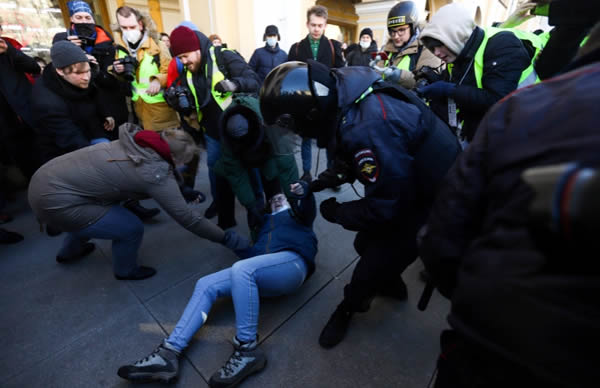
Police in Russia have arrested more than 2,000 anti-war protesters across the country, an independent monitor said, on the fourth day of President Vladimir Putin’s invasion of Ukraine that took many Russians by surprise.
OVD-Info, which has documented crackdowns on Russia’s opposition for years, said 2,114 protesters were arrested on Sunday.
This brought the tally of protesters arrested since Putin launched the invasion in the early hours of Thursday to 5,250, the monitor said.
In Moscow, riot police often outnumbered protesters, some of whom carried hand-written placards with peace signs and anti-war slogans in Russian and Ukrainian. Some wore masks with the word “Enough” emblazoned in the front.
A reporter for the independent television channel Dozhd was arrested during the protests despite showing his accreditation to the police and wearing a press vest.
Outside the upmarket Gostiny Dvor department store in downtown Saint Petersburg, hundreds of anti-war protesters stood together, linking arms and chanting.
Many held posters that read “No to war”, “Russians go home” and “Peace to Ukraine”.
“It is a shame that there are hundreds, maybe thousands, of us and not millions,” said 35-year-old engineer Vladimir Vilokhonov, who took part in the protest.
Another protester, Alyona Stepanova, 25, came to the protest with a packed bag in case “we get taken away”.
“We believe it is our duty to come here,” she said.
Riot police tried to deafen their anti-war shouts by blasting out patriotic music.
“I am against war. I was born in 1941 and I know what it means,” said Valeria Andreyeva, born the year Nazi Germany attacked the Soviet Union.
Sunday’s protests coincided with the seventh anniversary of the killing of opposition politician Boris Nemtsov.
In Moscow, some of the arrests took place at an improvised memorial just outside the Kremlin at the site where Nemtsov was shot, a Reuters witness said. “No to war!” shouted one of the demonstrators as he was being dragged away by the police.
Nemtsov was a prominent critic of Putin, Russia’s annexation of Crimea in 2014, and Moscow’s support for pro-Russian separatists in Ukraine, which ultimately led to what Putin labels a “special operation” to protect two separatist regions, although his troops are fighting in wider Ukraine.
Ukraine’s Western allies have imposed unprecedented sanctions in response to Russia’s land, sea and air invasion.
Putin ordered his military command to put nuclear-armed forces on high alert on Sunday as Ukrainian fighters defending the city of Kharkiv said they repelled an attack by invading Russian troops.
Tens of thousands of people across Europe marched in protest against Russia’s invasion on Sunday, with 100,000 people protesting in solidarity with Ukraine in Berlin.
Source: News Agencies























